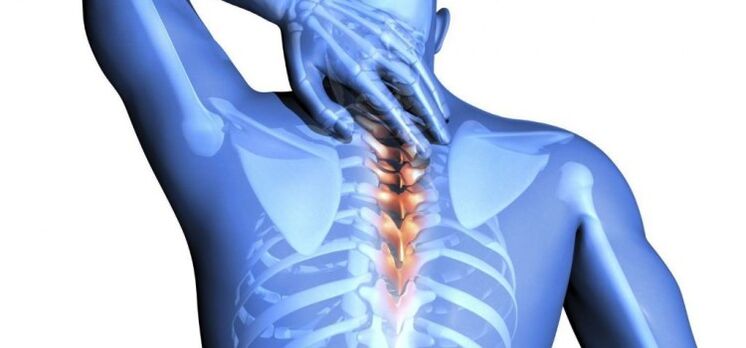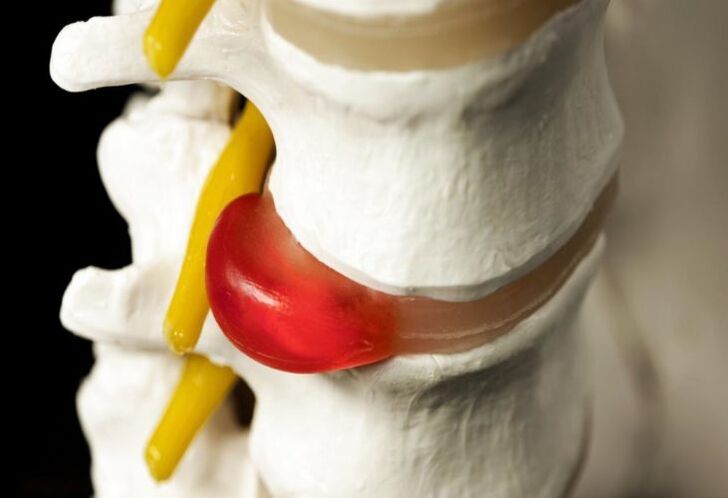
A difficult period of life comes for a person when his back often starts to hurt. This is not easy to bring discomfort and delivers a lot of inconvenience, but it can also unsettle a person for a long time.
With the modern rhythm of life, the population often neglects their health, referring to the lack of time. People try not to ask the question: why does the back hurt in the area of the shoulder blades?
They prefer not to waste precious time going to the clinic and are treated at home, not suspecting that this signal can be a symptom of the presence of serious or even dangerous diseases.

Main reasons
Why can there be a dull pain between the shoulder blades? Pain symptoms in the back in many people are associated with various mechanical injuries of the spine, pinched nerves or muscle strain.
It should be borne in mind that pain syndrome can be triggered by pathologies of the chest organs.
The causes of back pain between the shoulder blades can be conditionally divided into three categories:
- Diseases of the spinal column;
- diseases of internal organs;
- Other factors.
It should be clearly and clearly understood that pain is a symptom, and not an independent disease. Before you start using the medicines available in your home medicine cabinet, you should find out the reason: why does it hurt in the back between the shoulder blades?

To do this, you should visit a medical institution, consult a doctor and describe in great detail the symptoms, the time of their occurrence and possible provoking factors: injuries, professional activities, etc.
This information should help specialists determine the direction of the examination and make a diagnosis.
An inaccurate or untimely diagnosis can be detrimental to human health. Therapy may be prescribed, which will not bring a positive effect and result in the loss of precious time in treating the main cause of the pain.
It is important that a person himself understands the causes of pain and knows the possible list of pathologies that cause it.
muscle strain
Spasm or overstrain of muscle tissue does not belong to pathologies, but rather is a symptom of excessive physiological stress, or vice versa, its absence.
According to experts, back pain in the area of the shoulder blades is often experienced by patients whose professional activities are associated with prolonged static muscle tension.
The risk group includes, first of all, people of the following specialties:
- cashiers;
- Office workers;
- Programmers
- Drivers, etc.
However, doctors say that a person’s professional activity is not always the main cause of this symptom. In many cases, when examining patients who had complaints of pain in the region of the shoulder blades, most of them were found to have dysplasia.

Hereditary pathology, which is characterized by a defect in fibrous structures due to insufficient production of collagen - a substance responsible for the strength and elasticity of connective tissue.
For this reason, muscle fibers and ligaments are simply unable to withstand prolonged physiological stress.
Injuries
Perhaps the most obvious factor that causes back pain in the area of the shoulder blades is injury. Various kinds of hematomas, fractures, sprains that occur on the back as a result of mechanical damage are necessarily accompanied by a strong pain syndrome.

Spinal injuries can pose a real threat to human health. Displacement of the vertebral discs or a violation of the spinal cord can provoke complete or partial sensitivity of the limbs, limitation of motor functions, and in special situations lead to complete paralysis.
If the spine between the shoulder blades hurts for a long time due to mechanical injury as a result of emergencies, you should immediately seek medical help, even if the injury seems minor.
Any bruise or unsuccessful landing from a height can cause damage to the vertebral discs, which can be diagnosed only with the help of special equipment.
Only a specialist after a visual examination and additional X-ray examination, magnetic resonance or computed tomography can judge the severity of the injury and prescribe appropriate treatment.
Intercostal neuralgia
The second name for this disease is thoracalgia. A disease that practically does not develop in children, but affects older people due to age-related changes, bruises, and hypothermia.
It is manifested by acute and aching pain symptoms in the region of the ribs. Back pain in the area of the shoulder blades is also a concomitant symptom, often occurring and intensifying at the time of a change in body position.
Patients can hear complaints of pain during breathing, especially at the time of a sharp inhalation or exhalation.
Attention! Back pain between the shoulder blades and other symptoms similar to neuralgia may be a signal that the patient has heart pathologies. It is important to recognize the problem in a timely manner and take appropriate measures - this will save valuable time and possibly save the patient's life.
The main factor that causes bursting pain in the upper back with this disease is pinching or squeezing of the nerve roots.

This disease develops against the background of many factors: bruises, osteochondrosis, excessive physiological stress, metabolic disorders, stress, colds.
Muscle spasms or, conversely, excessive muscle tone of the extensors of the back, shoulders, and shoulder blades can also contribute to the development of the disease.
The symptomatology of neuralgia is very similar to the manifestations of some pathologies of the heart - ischemic disease, angina pectoris. Timely diagnosis and timely response can save a person's life.
First you need to learn to distinguish between neuralgia and heart disease. For rapid diagnosis, two main differences between these pathologies are used.

Neuralgia is characterized by:
- The pain syndrome persists for a long period;
- Symptoms are aggravated by body movements, when trying to take a sharp breath or exhale and press on the ribs.
The difference, for example, angina pectoris, is that neither the movement of the body, nor sneezing increase the pain syndrome. However, dynamic physical movements can affect heart rate and blood pressure.
Symptoms partially or completely disappear within a few minutes after the use of vasodilator drugs, such as nitroglycerin. To exclude the possibility of heart disease, contact a cardiologist and do an electrocardiogram.
Osteocondritis of the spine
Pain in the spine between the shoulder blades are considered one of the main symptoms of osteochondrosis. The disease is characterized by damage to the intervertebral discs.
In the course of development, the disease begins to affect other areas of the musculoskeletal system, and can also affect the nervous system of the body. According to the localization of the development of the disease, lumbar, thoracic and cervical osteochondrosis are distinguished.
The main factor in the development of pathology is malnutrition of the cartilage tissue of the joint. Previously, it was believed that this disease affects only the elderly group of patients, associating this with age-related changes in the body.
However, today experts note an increase in patients at a younger age.

Experts refer to the main factors in the development of the disease: a sedentary lifestyle, a hereditary factor, salt deposition, an unbalanced diet.
Attention! If your back hurts in the area of the shoulder blades due to the diagnosis of osteochondrosis, remember: physical activity, organizing a comfortable workplace and a balanced diet are effective methods of treating and preventing the disease.
Therefore, severe pain rarely appears due to osteochondrosis of the thoracic region. This section of the spinal column is the least mobile, and degenerative tissue changes there proceed much more slowly than in the cervical or lumbar region.
Often, it is cervical osteochondrosis that is a very common cause of pain between the shoulder blades in the spine. The pain "shoots through" the entire spinal column, descending from the upper sections of the spine to the lower back.
Herniated discs of the spine
Herniated intervertebral discs, according to some experts, are present in 30-40% of the population at one stage or another.
Most often, this pathology affects young people who lead an active physical lifestyle. It is injuries or heavy physical exertion that are the main cause of the development of the disease.
The mechanism of the disease is simple. The intervertebral disc is a semi-liquid jelly-like substance, which is surrounded by a rather dense shell. The main task of the disc is to soften and absorb the movement of the vertebrae.
Due to various factors: injuries, weakness of skeletal muscles, severe physiological stress, pathology of the spine, etc. There is a compression or decompression of the spinal column and tear of the outer shell of the disc.
At the same time, the jelly-like contents protrude into the spinal canal and compress one, two or more nerve endings, causing numbness of the extremities and pain.
Important! In the acute phase of the course of the disease, massage or warming sessions are categorically contraindicated.
Contrary to popular belief, in the treatment of the disease, it is in no case recommended to give up physical exercises.
It has been proven that the rejection of physical activity leads to muscle atrophy and prolongs the duration of the disease.
At the initial stages of development, a hernia is treated conservatively, but in the absence of positive dynamics of recovery within six months, the question of surgical intervention may be considered.

Pathologies of internal organs
Pain between the shoulder blade and the spine can cause a person to have diseases of the internal organs.
First of all, this applies to the organs of the cardiovascular and respiratory systems. The most common respiratory problems are: tuberculosis, pneumonia.
Common pathologies of the cardiovascular system are ischemic disease or, in common people, "angina pectoris". Refers to potentially life-threatening pathologies.
It has similar symptoms with neuralgia and it is important to learn to distinguish between them.

If you have symptoms: severe pain in the back between the shoulder blades, shortness of breath, cold sweats and rapid pulse, seek medical help immediately.
With some diseases of the gastrointestinal tract, the back between the shoulder blades also hurts. The main reasons for this: peptic ulcer, gastroesophageal reflux, diffuse spasm of the esophagus.
These pathologies often cause the following symptoms: burning in the esophagus, aching pain in the chest.
Patients complain that it aches in the middle of the solar plexus and gives in the back between the shoulder blades. Also, it should not be ruled out that back pain in the area of the shoulder blades can cause oncological causes.
Prevention and treatment
To determine an effective course of treatment for a particular disease, it is first necessary to answer the question: why does the back hurt between the shoulder blades? To do this, you should undergo a comprehensive examination by a specialist.
Treatment is prescribed after passing all the necessary procedures and on the basis of a diagnosis made by a specialist. With the development of certain diseases, self-medication can be not only ineffective, but even dangerous.
As you know, any disease is easier to prevent than to cure. Back pain in the shoulder blades can have different causes. What to do to eliminate them?
The answer is simple - to engage in prevention. Most diseases develop against the backdrop of an unhealthy lifestyle: give up bad habits, play sports, eat a balanced diet and this will reduce the risks of developing various diseases by at least half.























